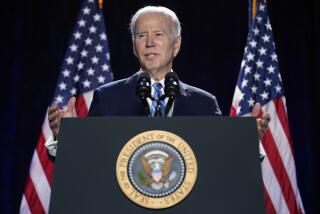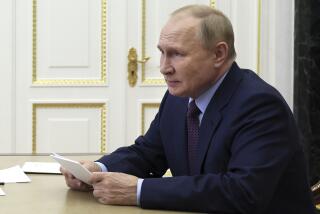White House Seeks New Funds to Oust Hussein : Foreign policy: Failure of past efforts to topple the Iraqi leader has spawned the $40-million CIA proposal.
- Share via
WASHINGTON — The Bush Administration has proposed almost tripling the $15-million budget for covert action to help overthrow Iraqi President Saddam Hussein, according to U.S. sources.
The request, which would increase CIA spending on the Iraq effort to $40 million, follows a year of U.S. frustration and embarrassment over Hussein’s ability not only to survive the political and military punishment from Operation Desert Storm, but to reconsolidate his singular hold over the country.
The new funding would go toward a program begun in May, 1991, when President Bush signed a presidential finding after two uprisings, by Hussein’s Shiite and Kurdish opponents, failed to force the defiant Iraqi leader from power.
The finding opened the way for U.S. covert action to destabilize the Iraqi regime and then to encourage internal forces to oust Hussein, the sources said.
The size of the increase for fiscal 1993 amounts to an admission that the U.S.-led effort has so far had limited impact, they added.
Despite recent public assessments by the Administration that Hussein is facing growing obstacles at home, senior U.S. analysts have told the Administration privately that Hussein may be able to hold on to power indefinitely.
Sources said the CIA funds would be used primarily in three ways: to increase U.S. surveillance over Iraq, particularly to monitor arms deployment and potential manufacturing in defiance of the United Nations cease-fire; to fund and assist at least three Iraqi opposition groups; and to increase an anti-Hussein propaganda campaign.
In the first year of the covert operation, U.S. satellite and imagery surveillance has effectively “penetrated” Iraq, performing a major role in tracking undisclosed arsenals of nuclear and chemical weapons of mass destruction, as well as ballistic missiles and their launchers, the sources said.
But access to significant human intelligence is still limited, they added. As a result, the Administration is less optimistic about the prospect of American covert action boosting the opposition or eroding Hussein’s position.
The Iraqi president has regrouped in part by playing to strong nationalist themes that neither opposition figures nor propaganda have been able to counter effectively, according to the U.S. analysts.
Hussein also continues to shake up his inner circle at irregular intervals to prevent any individual from becoming strong enough to challenge him or from being perceived by others, particularly within the military, as an alternative, the analysts say.
American aid to the Iraqi opposition includes groups operating both clandestinely inside Iraq and in exile. The sources did not identify the groups but said they represented a cross section of Iraq’s three major ethnic and religious groups--Kurds and Sunni and Shiite Muslims.
U.S. analysts have told Administration and congressional officials, however, that they do not know whether any of the groups, individually or together, are “viable” to oust Hussein or to replace him. Most Mideast experts believe that the Iraqi leader, who became president in 1979, cannot be overthrown unless key military officials play a major role.
The latest predictions are in stark contrast with other recent Administration claims about Hussein’s future. On the first anniversary of Operation Desert Storm in January, Bush predicted Hussein’s imminent ouster. Defense Secretary Dick Cheney said he would be removed “in the not-too-distant future.”
And in testimony before the House Armed Services Committee in March, CIA Director Robert M. Gates said U.S. intelligence had new evidence that the Iraqi leader’s power base was diminishing and that public restlessness was increasing, even within the Sunni Muslim minority that supports Hussein.
But 14 months after the Persian Gulf cease-fire, key U.S. analysts believe that Hussein may have overcome the biggest short-term domestic challenges. Despite the increasing toll on Iraqi society from U.N. economic sanctions, some of the shortages, particularly in the major cities, have been eased by a thriving black market and smugglers penetrating the Turkish, Iranian and Jordanian borders.
The U.S.-funded propaganda campaign includes radio broadcasts from the Arab world as well as publication of anti-Hussein literature and leaflets that are circulated throughout Iraq, according to the sources.
The largest broadcasting operation in the Arab world is run out of Egypt, the sources said. But Saudi Arabia, which hosted the multinational coalition that forced Iraqi troops to retreat from Kuwait last year, reportedly has balked at hosting more broadcasts aimed at its northern neighbor. The Saudi monarchy reportedly is nervous about potential retaliation by Baghdad if Hussein survives over the long term.
The proposed U.S. allocation for covert action against Iraq has widespread support among Republicans and Democrats who have been informed of the plan, the sources said. But some critics say the increase is still too small to be effective against a leader willing to put his people through virtually any hardship to stay in power.
More to Read
Sign up for Essential California
The most important California stories and recommendations in your inbox every morning.
You may occasionally receive promotional content from the Los Angeles Times.













